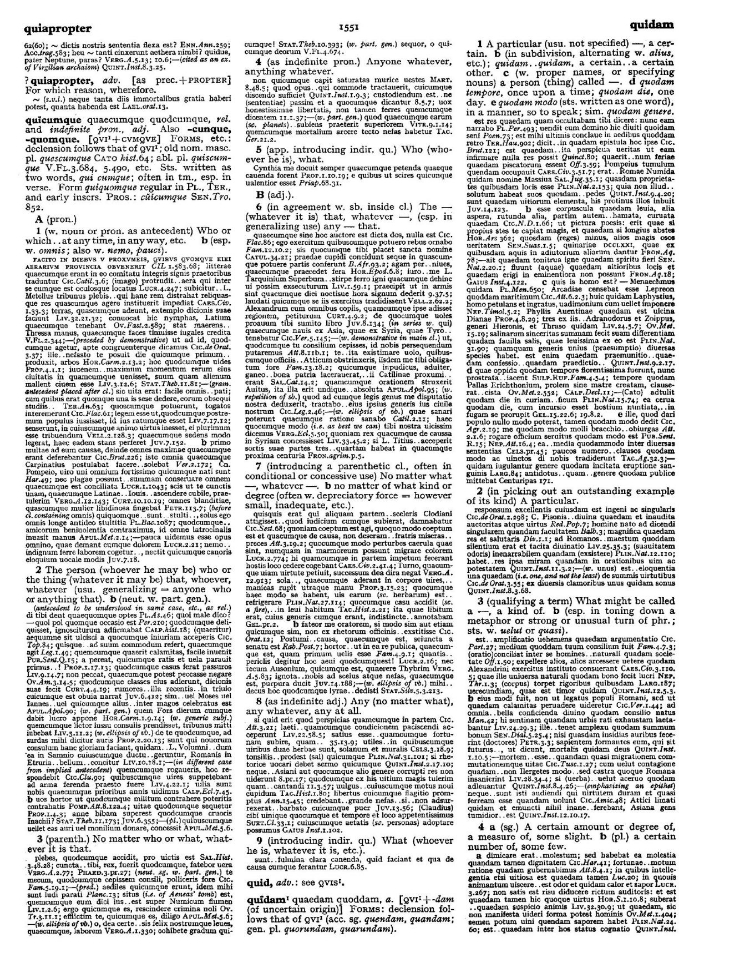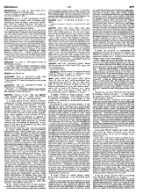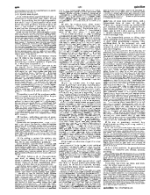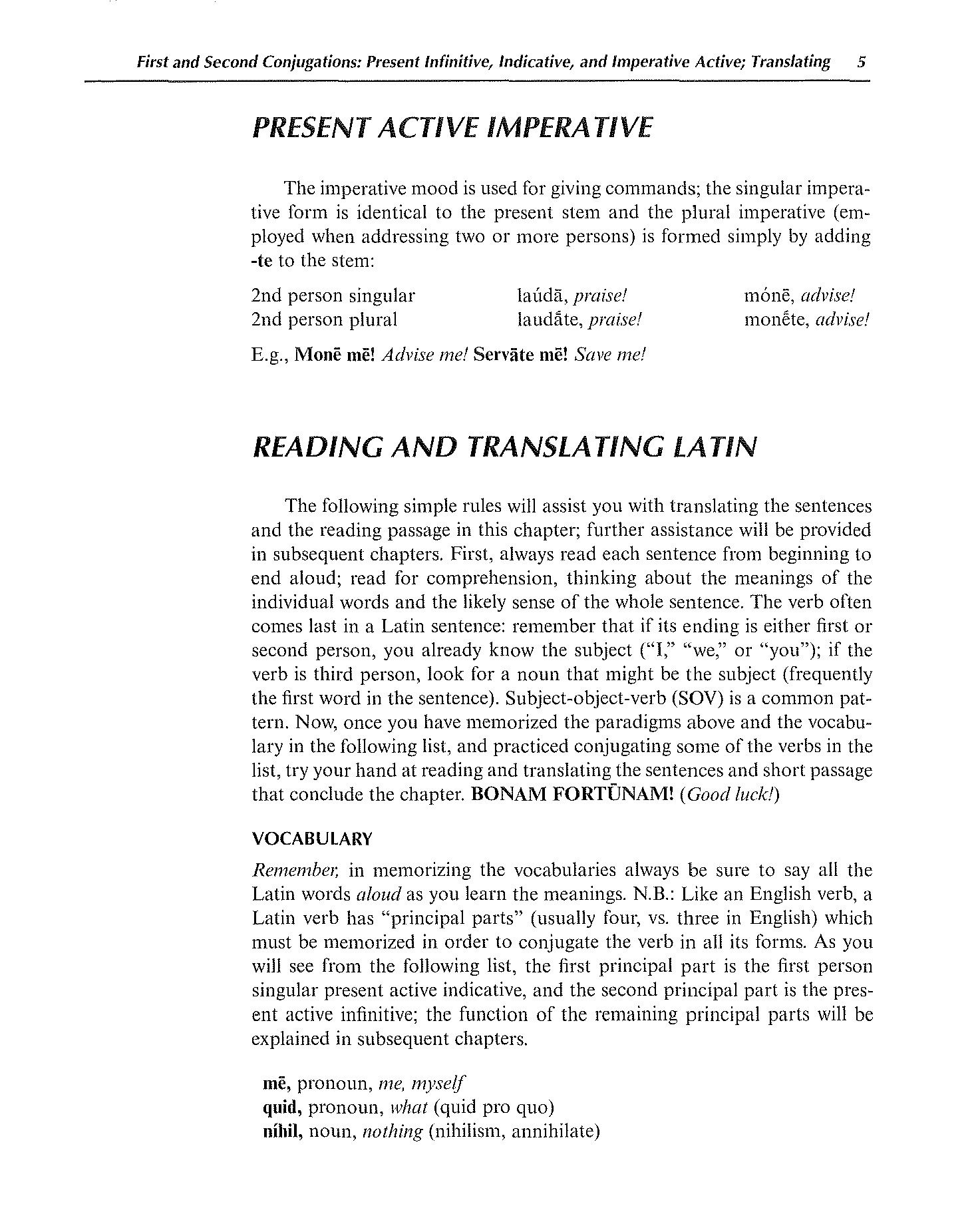
page_listing.tpl
page_subListingDetails.tpl
sub_listingDetails_style1.tpl
sub_listingDetails.title.tpl
quid what
quid is a Latin Pronoun that primarily means what.
Definitions for quid
Wheelock's Latin
Pronoun
- 1
what
English derivatives:
quid pro quo
Oxford Latin Dictionary
Pronoun
- 1
(masc.) What or which person? who? (b) (in indir. questions). (c) (in rhetorical qus.). (d) (applied to females). (e) (in pregn. or emphatic use, alluding to someone's character, position, etc.).
- 2
(neut.) What or which thing? what? (b) (in indir questions). (c) (in rhetorical questions).
Adverb
- 1
see: QVIS1.
- 2
For what reason? why?; quid ita? how so? (b) quid multa? quid plura? why say more, to a brief (see MVLTVS, PLVRES). (c) nec quid nec quare, for no apparent reason, without why or wherefore.
Sentences with quid
Latin to English
Quid est nōmen tibi?Compare What's your name?
Ego eīs pecūniam dabō; quid tū dabis?Compare I shall give them money; what will you give?
Nihil videō. Quid vidēs?Compare I see nothing. What do you see?
Quid tū fers? Quid ille fert? Dīc mihi cūr haec dōna offerantur.Compare What do you (sg.) bring? What does he bring? Tell me why these gifts are offered.
Quid est quod virī plūs metuant quam tyrannum?Compare What is there which mean fear more than a tyrant?
Promittas facito: quid enim promittere laedit? Pollicitis dives quilibet esse potest.Compare See that you promise: what harm is there in promises? In promises anyone can be rich.
Quid esse potest in otio aut iucundius, aut magis proprium humanitatis, quam sermo facetus ac nulla in res rudis?Compare What in hours of ease can be a pleasanter thing or one more characteristic of culture, than discourse that us graceful and nowhere uninstructed?
Victor timere quid potest? Quod non timet.Compare What can a victor fear? What he doth not fear.
Data sources
Notes
- Definitions
- Frederick M. Wheelock, Wheelock's Latin, 6th ed., rev. Richard A. LaFleur (New York, NY: HarperCollins Publishers, 2005): 5.
- P. G. W. Glare, Oxford Latin Dictionary, Vols. 1-8 (Oxford: Clarendon Press, 1982): 1551.
- Word frequencies
- Christopher Francese, "Latin Core Vocabulary," Dickinson College Commentaries, last modified 2014, http://dcc.dickinson.edu.
- Paul B. Diederich, The Frequency of Latin Words and Their Endings, PhD diss., (Columbia University, 1939).
- Louis Delatte, Suzanne Govaerts, Joseph Denooz, and Etienne Evrard, Dictionnaire fréquentiel et index inverse de la langue latine [Frequency Dictionary and Inverse Index of the Latin Language] (Liège, Belgium: Laboratoire d'analyse statistique des langues anciennes de l'Université de Liège [L.A.S.L.A.], 1981): 119.
Bibliography
Allen, Joseph H. Allen and Greenough's New Latin Grammar for Schools and Colleges: Founded on Comparative Grammar. Edited by James B. Greenough, George L. Kittredge, Albert A. Howard, and Benjamin L. D'Ooge. Boston, MA: Ginn & Company, 1903.
Crystal, David. A Dictionary of Linguistics and Phonetics. 6th ed. Oxford, UK: Blackwell Publishing, 2008.
Delatte, Louis, Suzanne Govaerts, Joseph Denooz, and Etienne Evrard. Dictionnaire fréquentiel et index inverse de la langue latine [Frequency Dictionary and Inverse Index of the Latin Language]. Liège, Belgium: Laboratoire d'analyse statistique des langues anciennes de l'Université de Liège (L.A.S.L.A.), 1981.
Diederich, Paul B. The Frequency of Latin Words and Their Endings. PhD diss., Columbia University, 1939.
Francese, Christopher. "Latin Core Vocabulary." Dickinson College Commentaries. Last modified 2014. http://dcc.dickinson.edu/latin-vocabulary-list.
Gildersleeve, Basil L., and Gonzales Lodge. Gildersleeve's Latin Grammar: Third Edition, Revised, and Enlarged. 3rd ed. London, England: Macmillan and Co., 1903.
Glare, Peter G.W. Oxford Latin Dictionary. Vols. 1-8. Oxford, England: Clarendon Press, 1982.
Krüger, Bernd. "Latin Conjugation Tables." Cactus2000. Accessed May 5, 2023. https://latin.cactus2000.de/index.en.php.
Pierson, Nick. "Sound of Text." Accessed October 26, 2019. https://soundoftext.com.
Wheelock, Frederick M. Wheelock's Latin. 6th ed. Revised by Richard A. LaFleur. New York, NY: HarperCollins Publishers, 2005.
Wiktionary Contributors. "Victionarium." Wikimedia Foundation, Inc. Updated March 18, 2019. https://la.wiktionary.org/wiki/Victionarium:Pagina_prima.
Citation
Chicago (17th ed.)
Allo Contributors. "quid (pron.) - Latin Word Definition." Allo Latin Dictionary. Last modified . Accessed February 23, 2026. http://ancientlanguages.org/latin/dictionary/quid.
Entry created on . Last updated on .









